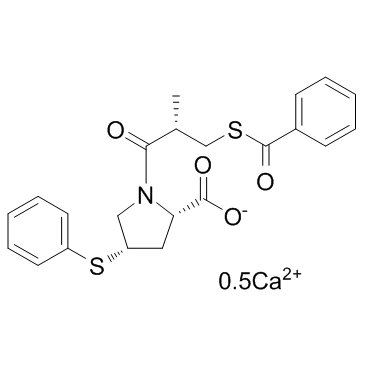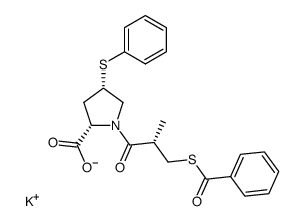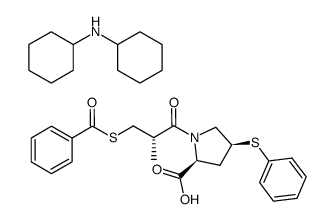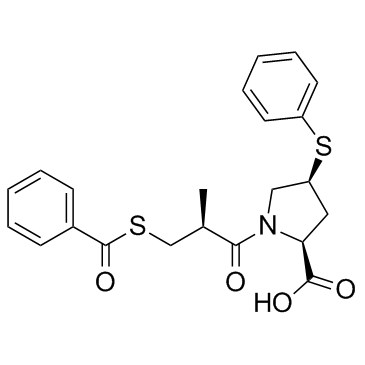81938-43-4
| Name | zofenopril calcium |
|---|---|
| Synonyms |
Calcium bis[(2S,4S)-1-[(2S)-3-(benzoylsulfanyl)-2-methylpropanoyl]-4-(phenylsulfanyl)-2-pyrrolidinecarboxylate]
ZOFENOPRIL CALCIUM Calcium bis[(2S,4S)-1-[(2S)-3-(benzoylsulfanyl)-2-methylpropanoyl]-4-(phenylsulfanyl)pyrrolidine-2-carboxylate] L-Proline, 1-[(2S)-3-(benzoylthio)-2-methyl-1-oxopropyl]-4-(phenylthio)-, calcium salt, (4S)- (2:1) MFCD08704648 Zofenopril calcium salt |
| Description | Zofenopril Calcium(SQ26991) is an antioxidant that acts as an angiotensin-converting enzyme inhibitor.Target: ACEZofenopril is a pro-drug designed to undergo metabolic hydrolysis yielding the active free sulfhydryl compound zofenoprilat, which is an angiotensin converting enzyme (ACE) inhibitor [1]. Zofenopril promotes the regeneration of peripheral nerve injuries in rat models [2]. Zofenopril increases SR calcium cycling and stimulates active calcium uptake into the SR [3]. |
|---|---|
| Related Catalog | |
| References |
| Density | 1.34 g/cm3 |
|---|---|
| Boiling Point | 646.3ºC at 760 mmHg |
| Melting Point | >250ºC |
| Molecular Formula | C22H22Ca0.5NO4S2 |
| Molecular Weight | 448.58 |
| Flash Point | 344.7ºC |
| PSA | 228.56000 |
| LogP | 7.80660 |
| Storage condition | Refrigerator |
|
Section1. IDENTIFICATION OF THE SUBSTANCE/MIXTURE Product identifiers Product name: Zofenopril Calcium CAS-No.: 81938-43-4 Relevant identified uses of the substance or mixture and uses advised against Identified uses: Laboratory chemicals, Manufacture of substances Section2. HAZARDS IDENTIFICATION Classification of the substance or mixture Classification according to Regulation (EC) No 1272/2008 [EU-GHS/CLP] Acute aquatic toxicity (Category 1) Chronic aquatic toxicity (Category 1) Classification according to EU Directives 67/548/EEC or 1999/45/EC Very toxic to aquatic organisms, may cause long-term adverse effects in the aquatic environment. Label elements Labelling according Regulation (EC) No 1272/2008 [CLP] Pictogram Signal wordWarning Hazard statement(s) H410Very toxic to aquatic life with long lasting effects. Precautionary statement(s) P273Avoid release to the environment. P501Dispose of contents/ container to an approved waste disposal plant. Supplemental Hazardnone Statements According to European Directive 67/548/EEC as amended. Hazard symbol(s) R-phrase(s) R50/53Very toxic to aquatic organisms, may cause long-term adverse effects in the aquatic environment. S-phrase(s) S60This material and its container must be disposed of as hazardous waste. S61Avoid release to the environment. Refer to special instructions/ Safety data sheets. Other hazards - none Section3. COMPOSITION/INFORMATION ON INGREDIENTS Substances Synonyms: (4S)-1-[(2S)-3-(benzoylthio)-2-methyl-1-oxopropyl]-4-(phenylthio)-L- proline calcium salt (2:1) Formula: C22H22NO4S2 · 0.5Ca Molecular Weight: 448,58 g/mol ComponentConcentration ZOFENOPRIL CALCIUM CAS-No.81938-43-4- Section4. FIRST AID MEASURES Description of first aid measures General advice Consult a physician. Show this safety data sheet to the doctor in attendance. If inhaled If breathed in, move person into fresh air. If not breathing, give artificial respiration. Consult a physician. In case of skin contact Wash off with soap and plenty of water. Consult a physician. In case of eye contact Flush eyes with water as a precaution. If swallowed Never give anything by mouth to an unconscious person. Rinse mouth with water. Consult a physician. Most important symptoms and effects, both acute and delayed To the best of our knowledge, the chemical, physical, and toxicological properties have not been thoroughly investigated. Indication of any immediate medical attention and special treatment needed no data available Section5. FIRE-FIGHTING MEASURES Extinguishing media Suitable extinguishing media Use water spray, alcohol-resistant foam, dry chemical or carbon dioxide. Special hazards arising from the substance or mixture Carbon oxides, nitrogen oxides (NOx), Sulphur oxides, Calcium oxide Advice for firefighters Wear self contained breathing apparatus for fire fighting if necessary. Further information no data available Section6. ACCIDENTAL RELEASE MEASURES Personal precautions, protective equipment and emergency procedures Avoid dust formation. Avoid breathing vapors, mist or gas. Ensure adequate ventilation. Environmental precautions Prevent further leakage or spillage if safe to do so. Do not let product enter drains. Discharge into the environment must be avoided. Methods and materials for containment and cleaning up Pick up and arrange disposal without creating dust. Sweep up and shovel. Keep in suitable, closed containers for disposal. Reference to other sections For disposal see section 13. Section7. HANDLING AND STORAGE Precautions for safe handling Provide appropriate exhaust ventilation at places where dust is formed. Conditions for safe storage, including any incompatibilities Store in cool place. Keep container tightly closed in a dry and well-ventilated place. Recommended storage temperature: 2 - 8 °C Specific end uses no data available Section8. EXPOSURE CONTROLS/PERSONAL PROTECTION Control parameters Components with workplace control parameters Exposure controls Appropriate engineering controls Handle in accordance with good industrial hygiene and safety practice. Wash hands before breaks and at the end of workday. Personal protective equipment Eye/face protection Use equipment for eye protection tested and approved under appropriate government standards such as NIOSH (US) or EN 166(EU). Skin protection Handle with gloves. Gloves must be inspected prior to use. Use proper glove removal technique (without touching glove's outer surface) to avoid skin contact with this product. Dispose of contaminated gloves after use in accordance with applicable laws and good laboratory practices. Wash and dry hands. The selected protective gloves have to satisfy the specifications of EU Directive 89/686/EEC and the standard EN 374 derived from it. Body Protection Choose body protection in relation to its type, to the concentration and amount of dangerous substances, and to the specific work-place., The type of protective equipment must be selected according to the concentration and amount of the dangerous substance at the specific workplace. Respiratory protection Respiratory protection is not required. Where protection from nuisance levels of dusts are desired, use type N95 (US) or type P1 (EN 143) dust masks. Use respirators and components tested and approved under appropriate government standards such as NIOSH (US) or CEN (EU). Section9. PHYSICAL AND CHEMICAL PROPERTIES Information on basic physical and chemical properties a) AppearanceForm: solid b) Odourno data available c) Odour Thresholdno data available d) pHno data available e) Melting point/freezingno data available point f) Initial boiling point and no data available boiling range g) Flash pointnot applicable h) Evaporation rateno data available i) Flammability (solid, gas) no data available j) Upper/lowerno data available flammability or explosive limits k) Vapour pressureno data available l) Vapour densityno data available m) Relative densityno data available n) Water solubilityno data available o) Partition coefficient: n- log Pow: 4,505 octanol/water p) Autoignitionno data available temperature q) Decompositionno data available temperature r) Viscosityno data available s) Explosive propertiesno data available t) Oxidizing propertiesno data available Other safety information no data available Section10. STABILITY AND REACTIVITY Reactivity no data available Chemical stability no data available Possibility of hazardous reactions no data available Conditions to avoid no data available Incompatible materials Strong acids and oxidizing agents Hazardous decomposition products Other decomposition products - no data available Section11. TOXICOLOGICAL INFORMATION Information on toxicological effects Acute toxicity no data available Skin corrosion/irritation no data available Serious eye damage/eye irritation no data available Respiratory or skin sensitization no data available Germ cell mutagenicity no data available Carcinogenicity IARC:No component of this product present at levels greater than or equal to 0.1% is identified as probable, possible or confirmed human carcinogen by IARC. Reproductive toxicity no data available Specific target organ toxicity - single exposure no data available Specific target organ toxicity - repeated exposure no data available Aspiration hazard no data available Potential health effects InhalationMay be harmful if inhaled. May cause respiratory tract irritation. IngestionMay be harmful if swallowed. SkinMay be harmful if absorbed through skin. May cause skin irritation. EyesMay cause eye irritation. Signs and Symptoms of Exposure To the best of our knowledge, the chemical, physical, and toxicological properties have not been thoroughly investigated. Additional Information RTECS: Not available Section12. ECOLOGICAL INFORMATION Toxicity no data available Persistence and degradability no data available Bioaccumulative potential no data available Mobility in soil no data available Results of PBT and vPvB assessment no data available Other adverse effects Very toxic to aquatic life with long lasting effects. no data available Section13. DISPOSAL CONSIDERATIONS Waste treatment methods Product Offer surplus and non-recyclable solutions to a licensed disposal company. Dissolve or mix the material with a combustible solvent and burn in a chemical incinerator equipped with an afterburner and scrubber. Contaminated packaging Dispose of as unused product. Section14. TRANSPORT INFORMATION UN number ADR/RID: 3077IMDG: 3077IATA: 3077 UN proper shipping name ADR/RID: ENVIRONMENTALLY HAZARDOUS SUBSTANCE, SOLID, N.O.S. (ZOFENOPRIL CALCIUM) IMDG: ENVIRONMENTALLY HAZARDOUS SUBSTANCE, SOLID, N.O.S. (ZOFENOPRIL CALCIUM) IATA:Environmentally hazardous substance, solid, n.o.s. (ZOFENOPRIL CALCIUM) Transport hazard class(es) ADR/RID: 9IMDG: 9IATA: 9 Packaging group ADR/RID: IIIIMDG: IIIIATA: III Environmental hazards ADR/RID: yesIMDG Marine pollutant: yesIATA: yes Special precautions for user Further information EHS-Mark required (ADR 2.2.9.1.10, IMDG code 2.10.3) for single packagings and combination packagings containing inner packagings with Dangerous Goods > 5L for liquids or > 5kg for solids. SECTION 15 - REGULATORY INFORMATION N/A SECTION 16 - ADDITIONAL INFORMATION N/A |
| Symbol |

GHS09 |
|---|---|
| Signal Word | Warning |
| Hazard Statements | H410 |
| Precautionary Statements | P273-P501 |
| Hazard Codes | N |
| Risk Phrases | 50/53 |
| Safety Phrases | 60-61 |
| RIDADR | UN 3077 9 / PGIII |
|
~% 
81938-43-4 |
| Literature: WO2007/3963 A1, ; Page/Page column 9; 11-12 ; |
|
~% 
81938-43-4 |
| Literature: US2009/176860 A1, ; Page/Page column 3 ; |
|
~% 
81938-43-4 |
| Literature: WO2010/84515 A2, ; Page/Page column 34 ; |
|
~% 
81938-43-4 |
| Literature: WO2010/84515 A2, ; Page/Page column 33-34 ; |
| Precursor 3 | |
|---|---|
| DownStream 0 | |



